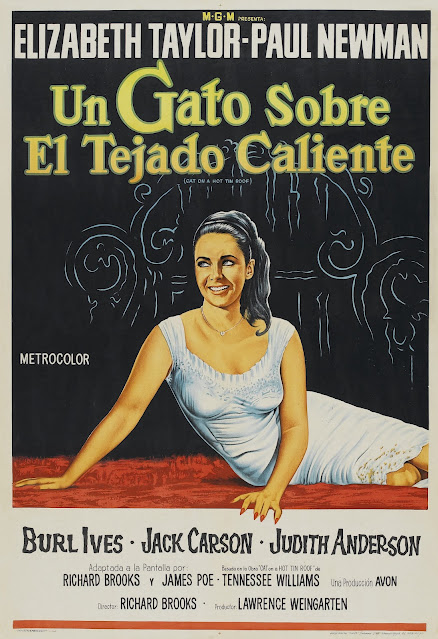--
Director: Richard Brooks
Elizabeth Taylor, Paul Newman, Burl Ives, Jack Carson, Judith Anderson, Madeleine Sherwood, Larry Gates, Vaughn Taylor.
Burl Ives gives the greatest portrayal of a literary character in film history, and he wasn't even recognized by an Oscar nomination, further evidence of the Academy's complete lack of credibility as an arbiter of screen excellence. The casting is brilliant: Tennessee Williams's Big Daddy was indeed big - larger than life, domineering, insensitive, self-absorbed. Burl Ives's Big Daddy is larger than life, insensitive, domineering, self-absorbed. Ives is "on" every moment. And every moment is true. Paul Newman's Brick, is as afraid of life as Big Daddy is in love with it. Yet, in his way, he's a chip off the old block - self-absorbed, insensitive. And domineering or, as Big Daddy and Maggie would have it, masterful, ready to take charge if he could just get over himself. I confess, I don't care for Elizabeth Taylor as an actress, but she is so right for the part, that I can't think of anyone else to fill it. Anyway, who else has eyes that could compete with Newman's? Judith Anderson plays the typical Williams matron, living in her house of delusions. She's Big Daddy's tormented, desperately lonely, unloved partner, who towards the end wins Big Daddy with her nobility and devotion. The under-appreciated Jack Carter has the unenviable role of Brick's pliant, conformist brother, Gooper, decent at heart but worn out after years of jumping through Big Daddy's hoops and still winding up on the short end, with a house full of brats, bred at Big Daddy's presumed bidding and delivered by a scheming, ambitious weasel of a wife. Gooper the only character I have a little trouble with, because his climactic speech, as rendered by Carter, is so heartfelt, that we are aggrieved with him at the injustice of Big Daddy's favoritism for the no-account but aesthetically more pleasing Brick. Perhaps an even more unenviable role is that of Gooper's wife, played to perfection by Madeleine Sherwood. Anyone who has grown up in the South has known "Sister Woman". I can assure those who haven't, that this character is not a stereotype or caricature. There are a few quibbles. One character, the family doctor, though played well by Larry Gates, has a dramatic function that's about as useful as the referee in a pro wrestling match, but not nearly as decorative. I guess he's included to provide plot information, but I think it could have been provided just as well without him. I was also put off by the contrived thunder claps at dramatic moments. Then, there were some continuity problems, such as different facial expression when shot angles were changed and Gooper's too many "Shut ups" to Sister Woman. If, as another reviewer has said, Tennessee Williams hated this film, then it couldn't have been because it was untrue to his work. If he disliked the changes and omissions, he should blame '50s prudishness, not the film, for dictating, say, the suppression of Brick's homosexuality. Williams wrote about lies and delusions, the good ones and bad ones. Well, that's what Cat on a Hot Tin Roof and Streetcar Named Desire and Glass Menagerie were all about. Tennessee Williams's stories about the South and its culture of delusion are not just rebukes of Southern hypocrisy and bloodymindedness but paeans to the gentle and genteel refuge which delusion provides. As Maggie "The Cat" says, "Truth, truth - everybody keeps hollerin' about the truth. Well, the truth is as dirty as lies." Finally, I think it was brilliant of Richard Brooks to insist on color, for Williams's stuff is talky, and with the drabness of a typical Williams set,




























































OOOOOOOOOOOOOOOOOOOOOOOOOOOOO














































.gif)
.gif)









































No comments:
Post a Comment